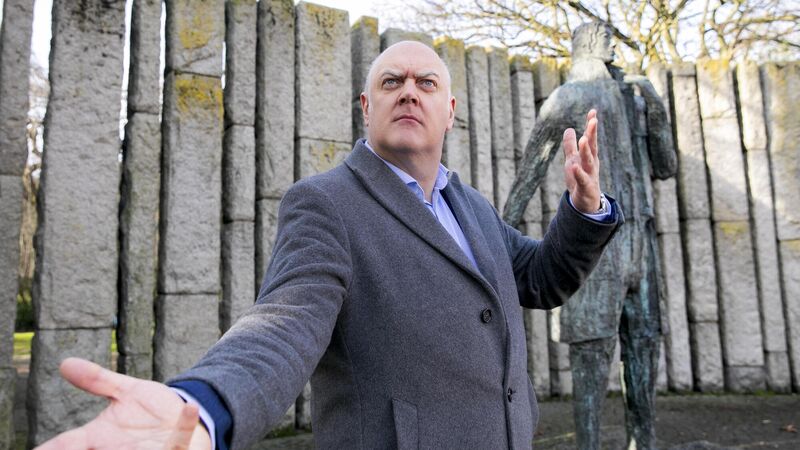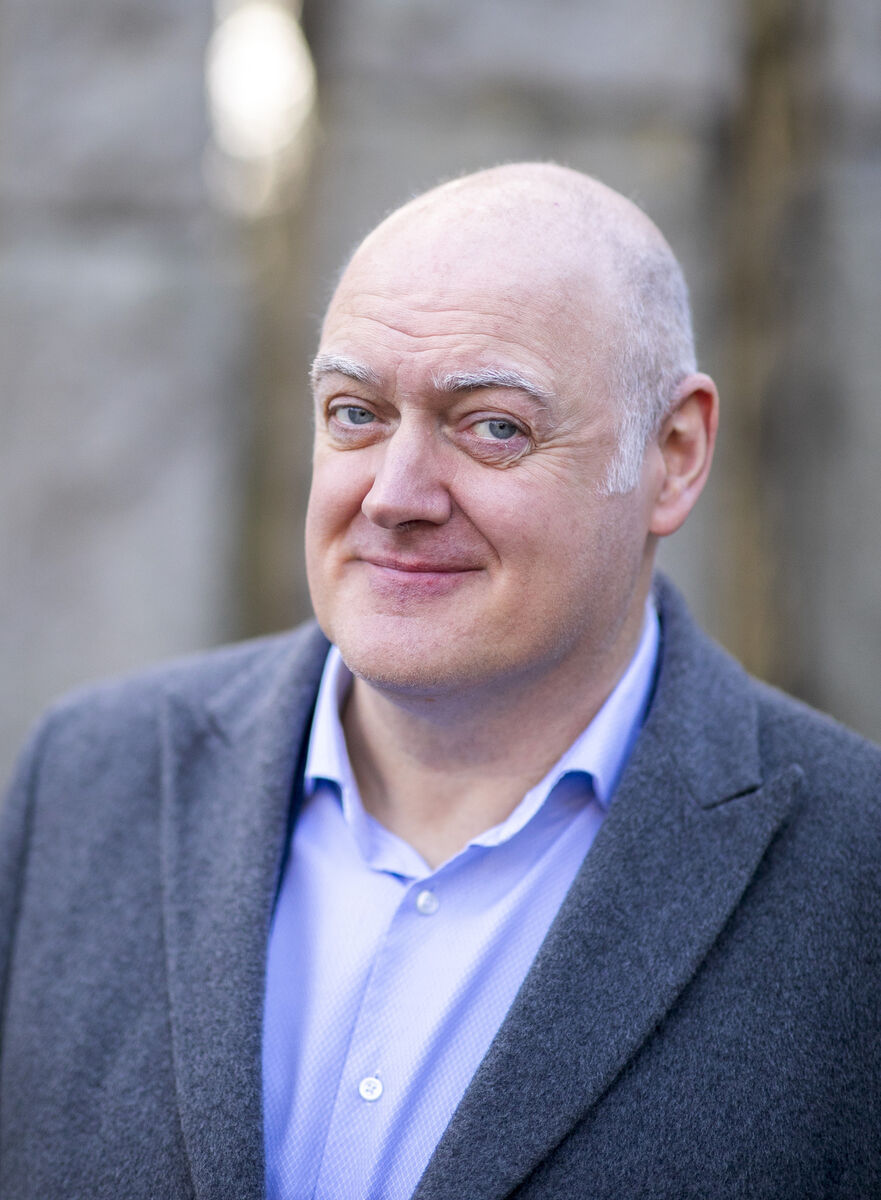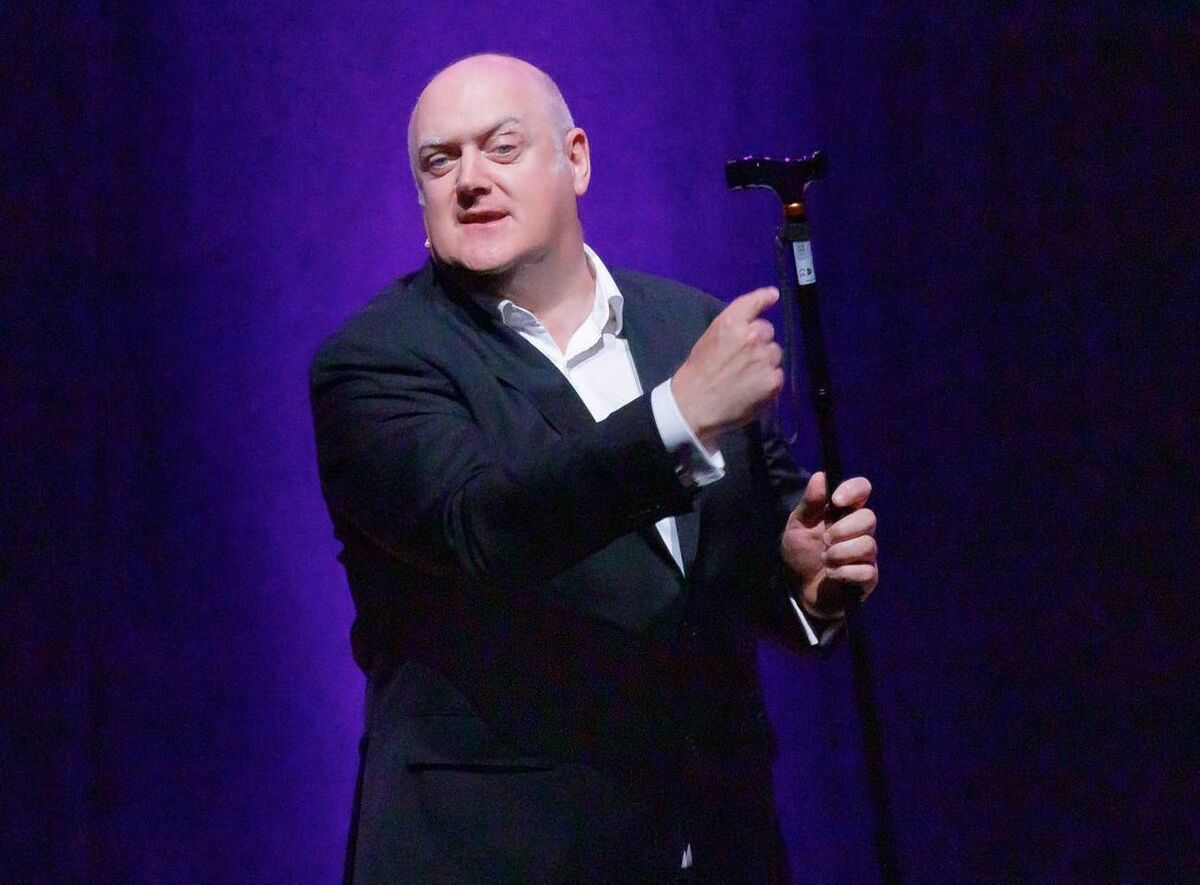Dara Ó Briain: 'Make a decision, commit to it, and then do the shit out of it'

Dara Ó’Briain at St Stephens Green, Dublin. Picture: Gareth Chaney
Dara Ó’Briain looms large on my computer screen, affable and engaging, if slightly windswept. He’s only a few miles from me, in the Shelbourne Hotel, but Storm Eowyn is about its business, and non-essential travel is verboten. And so, via Zoom, he stares wistfully out his sixth floor window, and describes for me an eerie scene.
“I am looking down Paul, on a weirdly empty city, and just as I say that, a lone man is cycling past. ‘Oh well, I’ve got to go to work.’ And is it only my impression or are you getting battered constantly by storms? We, that is people who live in London, graciously thank you for your sterling work in wind-breaking. Because the TV coverage of them is insane, and we’re like oh God, Ireland has been hit again.
“I was over about a month ago for the snow, it coincided with us bringing the kids to see the grandparents, both of whom were like oh my God you can’t do anything in this, and I’m like, stop looking at Sky News, look slightly to your left out the window, there’s nothing, it’s raining, it’s alright, but you’re watching constant pictures of Carlow, or Kilkenny, battered by snow. Bray was fine.”
Ó’Briain hails from north Wicklow, but moved to London more than two decades ago to pursue his rapidly escalating stand-up career. Sold-out tours, star turns at the Edinburgh Festival and TV gigs on shows like and have turned him into one of UK’s best loved comics.
His new show, debuted at Vicar Street a few weeks back.
“I should point out,” he tells me, “that the title is chosen a long time before the show is devised, so generally you just go for very kind of generic titles, like you know, ‘happy laughter hour with Dara O’Briain’. It really could have been called anything.”
Ó’Briain's last show, , concluded with a brilliant and unnerving long section in which he described his attempts to track down his birth parents. The comic was adopted, and during covid had decided to find out where he came from. It was masterfully done, and is a coda of sorts.
“There was always going to be a second part of the adoption story, and the second chapter occurs in this show. The last show was a really interesting piece to do because it was quite a serious story in some ways, you know there was quite a lot about the Irish state, and its attempts to obfuscate and block adopted people searching for their roots, and a young woman in the 1970s, what happened and the brutality of it all.
“So if that show was like , the second show is like , where an unsuspecting professional man of a certain age suddenly has a giant in a clown outfit walk into his life. That’s the comparison I make, because I think it explains both the shift in tone and also what it’s about. It’s a very different vibe to the first one.
“But the joy of it is it’s still a long story. I mean the original adoption story was a 35-minute bit, you’d do all the rest of it and you’d go, ok, here we go! When I wrote a set list down, I would write, ok leg injury, physiotherapy, missing body parts, long story - and those two words covered the last 35 minutes of the show. Well this is long story two.”

Was he nervous at all, I wonder, when he set out to perform that adoption story for the first time?
“Yeah I was worried about that because it was a step away from what I usually did. I can write lots of jokes, and go bang, bang, bang, but this was different, and once it occurred to me I had to decide whether or not to commit to this idea. Because you have to commit: I remember saying this to my kids who were worried about which essay to do, and I was going, look whatever you do just pick one, and do the shit out of it, that’s my parenting in a nutshell: make a decision, commit to it, and then just do the shit out of it.
“And so there was a touch of, if we’re going to do this, let’s do this, let’s absolutely go for it like, but even within that tour, there were nights where you would just look at the audience and go, no, I don’t think so, not tonight. Say it’s my first time in a place, or it’s a weird gig abroad, and you just think, no way. You have a fallback, and do something different.”
The opening nights of the new tour have gone down well at Vicar Street, he tells me.
“It’s been really good actually, we got a great standing ovation on the first night, which was fantastic. It’s always slightly nerve wracking because you write these shows in chunks, like 20 minutes and 30 minutes, and you do small gigs, and you very rarely get a chance to put them all together. That’s when you start thinking about the energy levels, and you only get to do that when you’ve done the whole thing together.” So it’s only when the missing component, the audience, is added, that you find out what’s working?
“It’s hard to express it without sounding incredibly pretentious, like I think I’m trying to put together a symphony or something here, but it’s weirdly about moving the audience’s energy for two hours. So there are times you want them to be up, and times you want them to rest again, and then you want to build it to a crescendo, make it peak for audiences at a certain point. It almost is sort of weirdly innate, and so all the work that you do in terms of writing the jokes are just the lego bricks essentially, and the joy is in putting them in the correct order.” He still gets nervous before every show.
"Even after all these years, you still get that feeling of oh if I could not do this now at this moment, I would happily do it. But then the minute you’re out you’re having fun with it, and it’s lovely.”
Ó’Briain will play at the Opera House next week, at Dublin’s Vicar Street through March, and at the Marquee in June.
“The Marquee is literally the largest night of the tour every year,” he says, “because I don’t do arenas really. There was a point in Britain where we toyed with doing bigger rooms, but it was never as appealing as doing it in a 1,000, 2,000 seater theatre, for all the hassle it would bring, and you’d lose all the nuance, it becomes impersonal.
“I mean you don’t want to be shouting your adoption story into a vast arena. “And then I met my mother!” It doesn’t really work. So the Marquee is probably the one that is closest to that, but it’s a weird venue and we’ve had some memorable moments in that tent. I remember, again, it was the night of a big storm and we were there, and every time I paused talking you could hear the thundering of the rain hammering down, and so I ended up going, ‘look there’s nothing for us out there any more, it’s all been washed away, All there is now is us in here in the Marquee, we are all that remains of humanity, and we have to rebuild’.”

Ó’Briain was once a plausible, serious person, studying serious things (maths, theoretical physics) before comedy interposed itself. How, and why, did he get into it?
“The why,” he tells me, “is very straightforward, it’s a rush. I remember watching debaters in first year at UCD. I had never done debating at school, or stood up in front of a crowd, and I spent first year sitting at the back of the hall watching people be ultra-confident and command the crowd, and getting laughs, and I just sat there being envious and thinking God I’d love to be able to do that. And then in second year I took part in this competition called maiden speakers, and told a joke at the start about law students or something, that got a laugh and a round of applause in this small room at lunchtime. And at that, a little dial in me that I’d never noticed before went shooting up, and went, we must have more of that.
“And so you then end up being the person who hosts the orientation meetings, because you’re doing more jokes, and being the go-between for blind date on science day and all these kind of things, and then a friend of mine set up a small variety club in a restaurant in Ranelagh, and he said look just come and do five minutes. And I fretted, I literally walked around Ranelagh for three hours beforehand, for the four or five minutes of jokes that I did, and it went well.
“Comedy’s all nursery slopes, it’s like, well you’d done five minutes how about ten minutes, and I suppose the biggest step was going from the sheltered confines of UCD and joking about university life to talking to actual people, that was probably the biggest step, more so than going to England or anything.
"And you just kind of get ten minutes here and 15 minutes there and then it slowly builds up, and then seven years later you’re doing the Montreal Festival and you’re going what am I doing here?”
Not too many jokes have been told about our War of Independence, but Dara Ó Briain has one. “Yes well, my granny fought in the War of Independence, she was only a teenager at the time. It’s a joke I did years ago in Edinburgh, but friends of mine still remember because I had a line in it about teenagers. As a 16-year-old anyway, my granny would relay messages from different battalions in north Wicklow, and she was running through fields in Shankill or Bray or somewhere, and a British army truck came rolling past so she jumped into a ditch and laid there while the British soldiers got out to look around.
“And the line I had was, a 16-year-old now, would they be happy to lie in a ditch? And then I had them taking out a phone and going ‘Am in a ditch. Where R U?’ For 20 years that’s been a joke, where Deirdre O’Kane, or my wife, will go ‘Where R U?’
He will be in an Opera House near U, shortly.
- Dara Ó Briain will play the Cork Opera House tonight, the INEC Killarney on March 23, Vicar St in late February and March, with extra dates in July, and the Marquee on June 29. There will be an ISL interpreter at Vicar St on March 29.
- daraobriain.com


